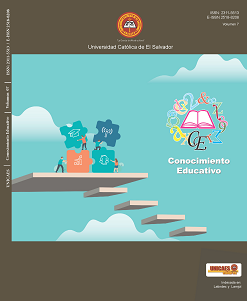The transformation of the teaching-learning process in Salvadoran educational centers
DOI:
https://doi.org/10.5377/ce.v7i0.10033Keywords:
Teaching-learning process, thinking routines, school gardens, linguistic competences, integrative activities, inverted learningAbstract
Education is a complex process that is increasingly influenced by the innovation of methodologies and other aspects related to teacher training. This research was performed in five schools in the country. The sample consisted of five teachers and 154 students from third cycle of basic education. To collect information, the techniques of interview, focus group, and observation were applied. Different problems were found during the diagnosis: improvement linguistic competence, systematization of the correct use of the school garden, the comprehension of literary works and systematization of integrative activities. Each one of them was intervened in the classroom for a month, through the research-action methodology. The following innovative techniques were applied within the study, depending on the case of each educational center: thinking Routines; Guide to the school garden; Guide for reading comprehension; Guide for integrative activities and the Inverted Learning Methodology. Later, during the observation, the impact of the implemented strategies was evaluated,
in order to verify the changes made by the teachers in their professional practice. As a main result, it was found that, when using innovative methodologies, it had a positive impact on the construction of meaningful learning; increasing the participation of students in the teaching-learning process. As a main result, it was found that, when using innovative methodologies, it had a positive impact on the construction of meaningful learning; increasing the participation of students in the teaching-learning process.
Downloads
673
Downloads
Published
How to Cite
Issue
Section
License
© Conocimiento Educativo
The copyright of the articles is transferred to the journal Conocimiento Educativo
As a user of this journal, you have:
● Open access to consult the information contained in this number
● Permission to copy, distribute, display, perform or combine the above practices, regarding the use of the information, as long as it is strictly non-profit.

This work is licensed under a Creative Commons Attribution-NonCommercial 4.0 International License.

